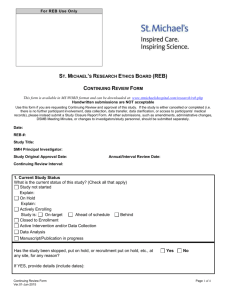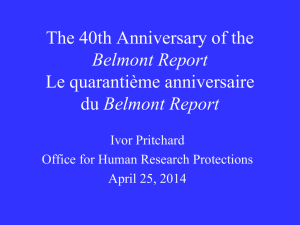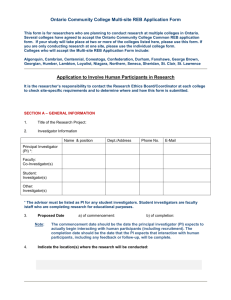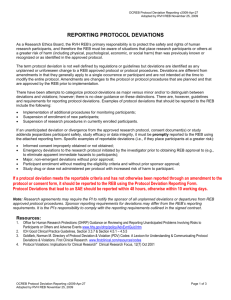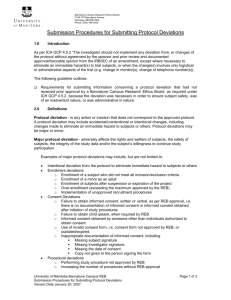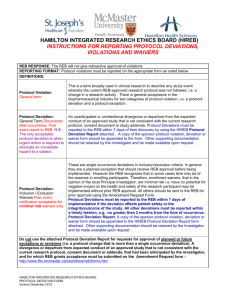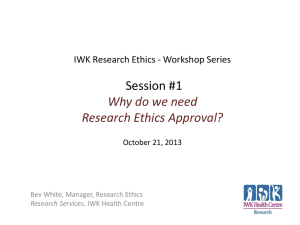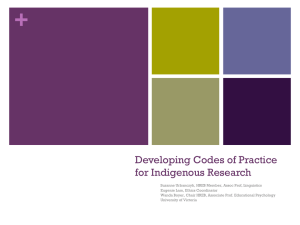Guidelines for the Continuing Review of Ongoing Research
advertisement
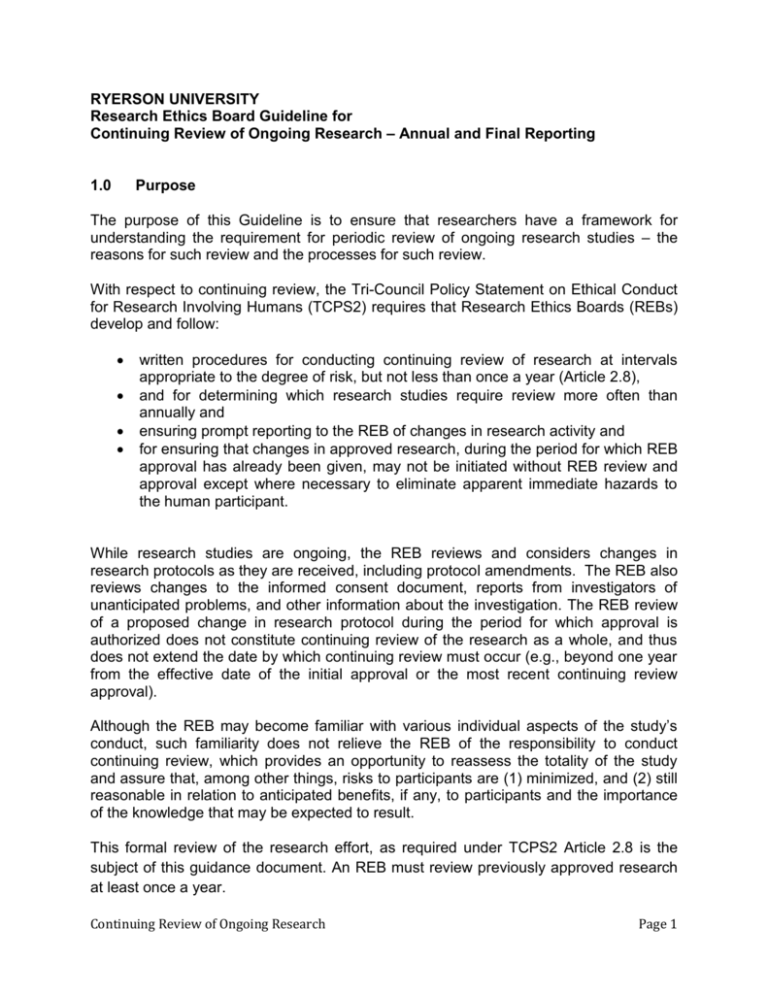
RYERSON UNIVERSITY Research Ethics Board Guideline for Continuing Review of Ongoing Research – Annual and Final Reporting 1.0 Purpose The purpose of this Guideline is to ensure that researchers have a framework for understanding the requirement for periodic review of ongoing research studies – the reasons for such review and the processes for such review. With respect to continuing review, the Tri-Council Policy Statement on Ethical Conduct for Research Involving Humans (TCPS2) requires that Research Ethics Boards (REBs) develop and follow: written procedures for conducting continuing review of research at intervals appropriate to the degree of risk, but not less than once a year (Article 2.8), and for determining which research studies require review more often than annually and ensuring prompt reporting to the REB of changes in research activity and for ensuring that changes in approved research, during the period for which REB approval has already been given, may not be initiated without REB review and approval except where necessary to eliminate apparent immediate hazards to the human participant. While research studies are ongoing, the REB reviews and considers changes in research protocols as they are received, including protocol amendments. The REB also reviews changes to the informed consent document, reports from investigators of unanticipated problems, and other information about the investigation. The REB review of a proposed change in research protocol during the period for which approval is authorized does not constitute continuing review of the research as a whole, and thus does not extend the date by which continuing review must occur (e.g., beyond one year from the effective date of the initial approval or the most recent continuing review approval). Although the REB may become familiar with various individual aspects of the study’s conduct, such familiarity does not relieve the REB of the responsibility to conduct continuing review, which provides an opportunity to reassess the totality of the study and assure that, among other things, risks to participants are (1) minimized, and (2) still reasonable in relation to anticipated benefits, if any, to participants and the importance of the knowledge that may be expected to result. This formal review of the research effort, as required under TCPS2 Article 2.8 is the subject of this guidance document. An REB must review previously approved research at least once a year. Continuing Review of Ongoing Research Page 1 2.0 Criteria for Approving Research During Continuing Review Federal regulations set forth the criteria for REB approval of research. These criteria apply to both initial review and continuing review. In order to approve research, the REB must determine that all of following requirements are satisfied: Risks to subjects are minimized; Risks to subjects are reasonable in relation to anticipated benefits, if any, to participants, and the importance of the knowledge that may be expected to result; Selection of participants is equitable; Informed consent will be sought from each prospective participant or the participant’s legally authorized representative, and appropriately documented; Where appropriate, the research plan adequately provides for monitoring the data collected to ensure the safety of participants; Where appropriate, there are adequate provisions to protect the privacy of participants and to maintain the confidentiality of data; Appropriate additional safeguards are included to protect vulnerable participants; and Where the study involves individuals who lack the capacity to provide consent, the research complies with TCPS2 Article 3.9. The REB has the authority to disapprove or require modifications in (to secure reapproval of) a research activity that does not meet any of the above criteria (e.g., the full study or any part thereof, such as changes to the protocol, advertisements, etc. The REB is required to review the research and maintain records of its continuing review activities. Investigators are responsible for ensuring that studies they conduct comply with applicable regulatory requirements. To ensure that the REB can carry out its review prior to the expiration date of the current REB approval, investigators are asked to follow the policies and procedures for continuing REB review of research. Investigators will be made aware of the required frequency of ongoing review when they receive initial approval of the research study. This notice will be included in their original letter of ethics approval. At a minimum, investigators will be required to submit required information prior to the anniversary of the original date of ethics approval. Additionally investigators will receive email notification in the weeks prior to expiry of their ethics approval requesting the submission of information required for the ongoing review of the study. Continuing Review of Ongoing Research Page 2 Continuing review requires submission of a written progress report/brief project summary that includes the following or references other documents made available to the REB: The number of participants accrued; (For multi-site studies, the number of subjects accrued at the local site and the number accrued study-wide, if available, should be provided.) A brief summary of any amendments to the research approved by the REB since the REB’s initial review or the last continuing review; Any new and relevant information, published or unpublished, since the last REB review, especially information about risks associated with the research; A summary of any unanticipated problems A summary of any participant withdrawals from the research since the last REB review, and the reasons for withdrawal, if known; and A summary of any complaints about the research from participants enrolled at the local site since the last REB review; The REB will focus on any new information provided by the investigator that may alter the prior determinations, particularly with respect to the prior evaluation of the potential benefits or risks to the participants. The REB will also assess whether there is any new information that would necessitate revision of the protocol and/or the informed consent document. 3.0 Frequency of Continuing Review The REB will determine the frequency of continuing review for each study to ensure the continued protection of the rights and welfare of research participants. The TCPS2 requires that REBs conduct continuing review of research at intervals appropriate to the degree of risk posed to the subjects, but not less than once a year. More frequent review (i.e., more frequently than once per year) is appropriate, for example, when the risks to subjects require close monitoring. The REB will consider the factors set forth below when deciding on an appropriate interval for continuing review: The nature of and any risks posed by participation in the study; The degree of uncertainty regarding the risks involved; The vulnerability of the subject population; The experience of the investigator in conducting similar research The REB’s previous experience with that investigator (e.g., compliance history, previous problems with the investigator obtaining informed consent, prior complaints from subjects about the investigator); The projected rate of enrollment; and Continuing Review of Ongoing Research Page 3 Whether the study involve novel processes. At the time of initial approval of the study, the investigator will be notified in writing of the interval at which continuing review will occur (at least annually) and the date by which continuing review must occur. Similarly, at the time of continuing review, the REB will consider whether the current frequency of continuing review for the study is adequate or should be adjusted. The REB’s determinations regarding the approval of research will be communicated to the investigator in writing. This written determination will also notify the investigator of the required interval for, and expected date of, continuing review. Although the REB will make every effort to ensure that the investigator has adequate notice prior to the expiration date of ethics approval during which they may submit the information required for ongoing review, it is the investigator’s responsibility to ensure that ethics approval does not lapse. Review of an amendment to a protocol during the period for which approval is authorized does not constitute continuing review of the study as a whole, and thus does not extend the date by which continuing review must occur (i.e., not more than one year from the original approval date or most recent continuing review approval date). 4.0 Lapse of REB Approval When continuing review of the research does not occur prior to the end of the approval period specified by the REB, REB approval expires automatically. A lapse in REB approval of research occurs whenever an investigator has failed to provide continuing review information to the REB or the REB has not conducted continuing review and reapproved the research by the expiration date of REB approval. In such circumstances, all research activities involving human subjects must stop. Enrollment of new subjects cannot occur after the expiration of REB approval. Continuing Review of Ongoing Research Page 4
